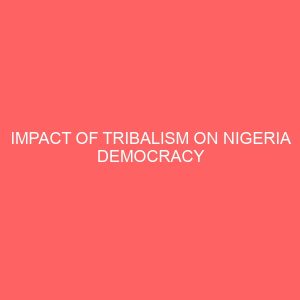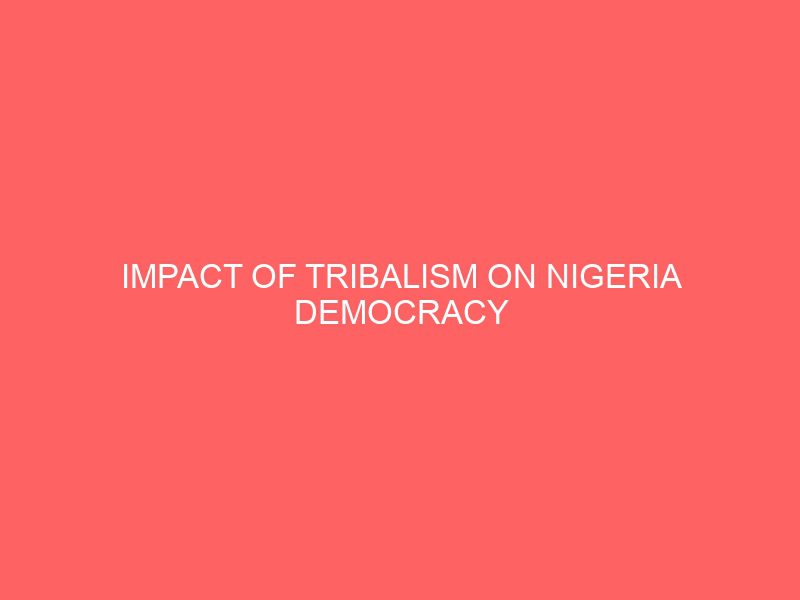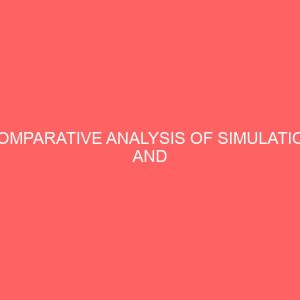Description
CHAPTER ONE
1.1 Background of the Study
In Nigeria since the immediate past independence era, Nigeria State has been undergoing several forms of ethnic clashes both political and socioeconomic.
Other equally abound which are of ethnic religious dimension at different points under the post colonial arrangement and various regimes these situation have severally tempted the total paralysis of Nigerias Federal structure and the weakening of its democratic spirit. In particular, contemporary Nigeria is replete with the division of her people along various ethnic and religious constituencies. A dimension of this readily is to be found interalia in the recent ethnic conflict in Aguleriumuleri war of attrition over the Otuocha piece of land the guardian 1999:12 agitations by the movement for the actualization of a sovereign state of Biafara MASOB, the Urbobo Itsekiri crisis the movement for the survival of the Ogoni people.
Ethnicity in Nigeria has attained monumental levels. These include the Ife Modakeke Communal Conflicts of Osun State in 1999 the Hausa/Fulani and the Ketaf in Kaduna State. In 1999 the Ijan and Sekiris of Warri in Delta State, 2000 the Hausa/Fulani and Yoruba ethnic Conflicts in Ogun and Lagos State respectively, 1999/2001 the Jukunchaba and Kuteb and the Tivs in Taraba State 1989/2000, Igakwu omer Aguleriuma leri and Umeleri Communal Conflicts of Anambara in 2002 2004.
All these are clear signals and obvious indicated that all is not well with ethnicity and democratization in Nigeria.
1.2 Statement of the Problem
The goal of any research is to identify certain problems and find solutions to such problems. In connection with this study, the researcher has observed the following problems to which seek solution.
Operation of a true democratic system has been difficult in Nigeria and this has often leads to political instability ethnicity political unrest and other socioeconomic problems.
Nigeria as a federal state has faced many problem relating to substance of democracy. The major problem is that the project is all about the impact on democratization in Nigeria. Each group wants to retain government powers in its hand. All these have direct negative impacts on average Nigerias. Hence the intention of this study is to find the way forward out of these predicaments.
1.3 The Objectives of the Study
This study aims at enlightening the incoming generations about the previous and attendant ethnic clashes in Nigeria. The causes, impact on democratization in Nigeria and postulate ways to avoid such problems.
In the same vein, the researcher shall examine the role of ethnocentrism in any democratic set up and its contribution to the betterment of democracy in a federal state of Nigeria.
1.4 Significance of the Study
This write up has its own focus of benefiting the potential leaders of Nigeria so as to try as much as possible to guide against ethnic, a confused and complicated situation in Nigeria.
All the same, Nigerians especially the coming generation will gain one or two things in this work on ethnicity and its democratization impact on Nigeria.
Lastly, solution to Nigeria’s tribal problems and the sustenance of democracy would emerge at the end of the study.
1.5 Scope of the Study
The write up shall not be extended more than the issue and problems of ethnicity in Nigeria and how ti affects the process of Democratization since independence till date between 1999 till date.
1.6 Limitation of the Study
The major limitations that are envisaged in this work are the problems relating to time factors unwillingness of respondent to give objective answers to pertinent questions passed to them from which logical conclusion can be drawn.
1.7 Methodology
The method used to collect information and data for this project is historical method by consulting the academic papers, such as journals and some textbooks, as well as questionnaires administration.
1.8 Hypotheses
The following hypotheses are put forward.
i If there any relationship between ethnic diversity and sustenance of democracy.
ii What are the effects of ethnocentrism on Nigeria Democracy
iii What are the ways of combating ethnic rivalries in a Democratized Nigeria policy
iv What are the implications of ethnic conflict on Democracy
1.9 Definition of Terms
Ethnicity: Is the consciousness of and belonging to a particular ethnic or tribal group in a large society.
Democracy: As a system of government under which the people exercised their voting power to close their representatives.
Crisis: This simply means a time of great difficulty or danger or when an important decision must be made.
Federalism: Is a system of government in which governmental powers that exists in a country are shared between a central government that represents the whole country and government of component regions or states.








Reviews
There are no reviews yet.